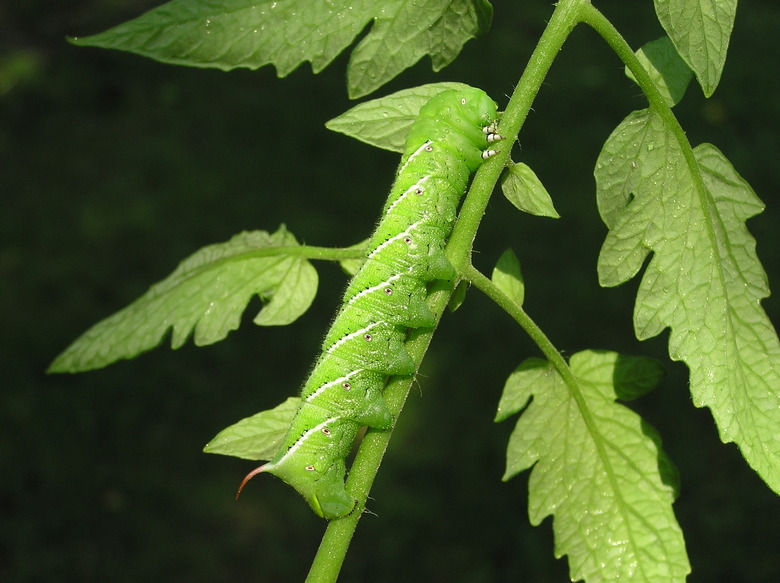The Life Cycle Of The Tomato Hornworm
Tomato hornworms (Manduca quinquemaculata) get their name from the long horn-like tail on the larvae or caterpillar's posterior end. While they do eat tomato plants, they also eat other members of the nightshade (Solanaceae) family, including potatoes, eggplants and capsicums. The tomato hornworm life cycle follows a complete metamorphosis developmental pattern, and the larval stage and the adult stage look completely different.
Tomato Hornworm Identification
Tomato Hornworm Identification
Tomato hornworms are sometimes confused with the closely related species, tobacco hornworms (Manduca sexta). A key way to tell these caterpillars apart is by the markings on their bodies. Tomato hornworms have yellow or white V-shaped markings with a black horn, while tobacco hornworms have diagonal white lines and a red horn.
The adult moths are often called sphinx moths, five spotted hawkmoths or hummingbird moths. They have a relatively large body with five large orange spots along either side of their abdomen. The adult tobacco hornworm moths look very similar except they have six spots down each side of their abdomen, which are often a more distinct, vibrant orange color.
Tomato Hornworm Life Cycle
Tomato Hornworm Life Cycle
The tomato hornworm life cycle has four stages: egg, larva or caterpillar, pupa, and adult moth. The tomato hornworm eggs are a pearly pale green to greenish-yellow color and measure less than 0.039 inches. After the caterpillars hatch, they eat voraciously. As they grow, they begin to get too big for their hard "skin," or exoskeleton, and shed it off to form a new one through a process called molting. The time in between each molting phase is called an instar. Tomato hornworm caterpillars go through five instars before they become pupa.
The pupa develops in a small space underground. During pupation, the caterpillar's body disintegrates and reorganizes itself into an adult moth. After emerging from their puparium, the moths are nocturnal and fly around, feeding on nectar from flowers and seeking mates. Post-mating, the female goes off to lay her eggs on a plant in the nightshade family that the larvae like to eat, and the tomato hornworm life cycle begins again.
Tomato Hornworm Eggs
Tomato Hornworm Eggs
A moth lays between one and five eggs per plant. She carefully lays her eggs on the undersides of leaves using an elongated organ on her posterior called an ovipositor. In her lifetime, she can lay between 1,000 and 2,000 tomato hornworm eggs.
Tomato Hornworm Caterpillar
Tomato Hornworm Caterpillar
Often called tomato caterpillars for short, two or three of these ravenous larvae can demolish all the leaves on an entire plant. If they are still hungry, sometimes they will also eat the fruit. When they eat the fruit they leave large open wounds on the surface rather than boring small holes in it. Occasionally they will move to a new plant. If they do, it generally won't be until their fifth instar. The caterpillars feed for three to four weeks until they reach three or four inches in length.
Tomato Hornworm Pupa
Tomato Hornworm Pupa
Once fully grown, caterpillars drop off the plant to the ground and dig four to six inches down into the soil to create their pupation chamber. Each summer there are two generations of larvae. First-generation tomato hornworm pupae take two weeks to pupate and emerge mid-summer. The second-generation pupae stay in the soil over the winter and the moths emerge in spring.
Tomato Hornworm Moths
Tomato Hornworm Moths
The moths' wingspan is four to five inches wide. These large moths are strong, nimble flyers. They have a long proboscis mouthpiece which they use to drink nectar from nocturnal flowers. Though the caterpillars are highly destructive, the moths play important pollination roles for many plants. The adults live for several weeks.
References
- University of Florida: Featured Creatures, Tobacco Hornworn, Tomato Hornworm
- University of Minnesota Extension: Tomato Hornworms in Home Gardens
- University of Florida: Featured Creatures, Tobacco Hornworm
- Michigan State University Extension: The Tomato Hornworm and The Tobacco Hornworm
- Oaklahoma State University: Tomato Hornworm
Cite This Article
MLA
Jerrett, Adrianne. "The Life Cycle Of The Tomato Hornworm" sciencing.com, https://www.sciencing.com/the-life-cycle-of-the-tomato-hornworm-13406136/. 30 September 2021.
APA
Jerrett, Adrianne. (2021, September 30). The Life Cycle Of The Tomato Hornworm. sciencing.com. Retrieved from https://www.sciencing.com/the-life-cycle-of-the-tomato-hornworm-13406136/
Chicago
Jerrett, Adrianne. The Life Cycle Of The Tomato Hornworm last modified March 24, 2022. https://www.sciencing.com/the-life-cycle-of-the-tomato-hornworm-13406136/
